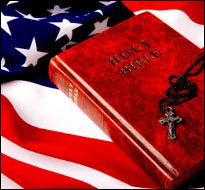The First Amendment of the U.S. Constitution formally separated church and state in United States more than 200 years ago, yet religion continues to play an outsized role in American politics. In recent history, “religious traditionalists” have often aligned with the Republican Party, whose platforms are intended to resonate with religious-minded voters on social issues. The 2012 election is no exception, with same-sex marriage and abortion prominent in the ongoing debate, and potential voters’ religious convictions often drive decisions on the candidates to support.
A 2012 study from Louisiana State University published in The Journal of Politics, “Courting Christians: How Political Candidates Prime Religious Considerations in Campaign Ads,” investigated the extent to which religious messages embedded in a political campaign affects a voter’s opinion of the candidate. Researchers administered a pre-test measuring traditional religious attitudes to 562 participants, and then randomly assigned them to one of four experimental conditions: high or low levels of information from two Senate campaigns, and high or low levels of religious cues embedded in the candidates’ TV advertisements.
Key study findings include:
- When religious cues are present in the advertisement, but additional secular information about the candidate is not, the “religious traditionalism” of respondents (as measured by variety of survey questions), “is a strong predictor of candidate preference.”
- Traditional responses are stronger when political information about the candidate is absent. “Exposing the participant to information about the candidate reduces the effect of religious code words and symbols embedded within campaign advertisements.”
- “Religion appears more consequential among less informed voters primed with religious cues… candidates will be more effective in activating traditionalism mong voters possessing less information.”
- “Even among (respondents) who adhere to strict and traditional interpretations of biblical doctrine, these considerations are attenuated in the presence of secular information.”
The authors concluded that while an advertisement’s religious cues may focus attention on the candidate’s religious credentials, the more a voter knows about a candidate, the less salient this messaging becomes. Further research is suggested to ascertain the “consequences of implicit versus explicit religious appeals” in political campaigns.
Tags: religion, cognition


Expert Commentary